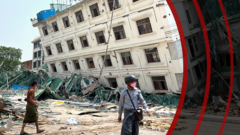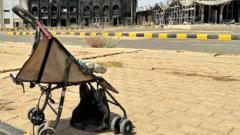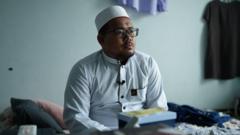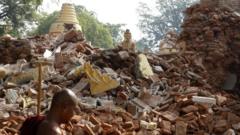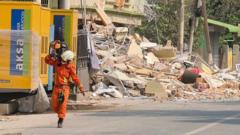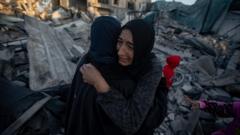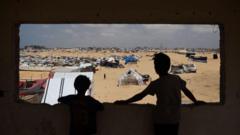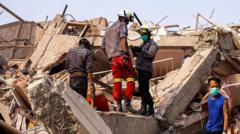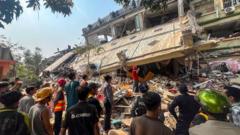The battered city of Khartoum faces uncertainty as citizens embrace newfound freedom amidst deep devastation.
**Khartoum's Fragile Moment: Aftermath of Conflict Frees City Amid Ruins**
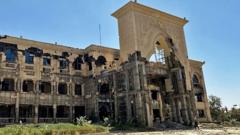
**Khartoum's Fragile Moment: Aftermath of Conflict Frees City Amid Ruins**
Destruction marks victory celebrations as Sudan's army retakes the capital from the RSF.
The heart of Khartoum stands eerily quiet, the remnants of urban combat echoing throughout the Sudanese capital following the army's recent victory over the paramilitary Rapid Support Forces (RSF). Our team arrived just days after the army's reclaiming of central Khartoum, a critical juncture in a civil war fueled by power struggles that have raged on for two tumultuous years. Once a dynamic center for commerce and governance, Khartoum is now a burnt-out vestige of its former self.
Driving through the heart of destruction, we first visited the presidential palace—a significant stronghold for the RSF at the war's onset. The debris-laden floors are a stark reminder of the violence that has transpired, with only remnants of official furnishings remaining while looting has stripped the place of valuable items. The chaos is evident, with shattered entrances and bloodstains highlighting the ferocity of the battles fought.
Despite the devastating backdrop, celebrations erupted with the onset of the Eid holiday. Soldiers, hailed as heroes, feasted and danced at the presidential palace, evoking joy amidst the ruins. Nonetheless, the cost of this victory is grave; central Khartoum lies in tatters, with government ministries and banks reduced to blackened shells, and the airport, a wreckage of burnt planes and debris.
As we maneuvered through the city, the horrific sights continued; we encountered unexploded ordnance and grim reminders of loss, including scattered body parts. A visit to St Matthew's Cathedral was momentarily uplifting, its painted ceiling intact despite a shell's intrusion, a rare sanctuary amid devastation.
Around diplomatic missions, RSF slogans mar the walls, and damaged vehicles litter lots as embassies evacuated their personnel. This civil war, the third in Sudan's 70-year history, has wreaked devastation upon the nation's core, leaving an uncertain future in its wake.
Nevertheless, some residents embraced hope this Eid, marking their first celebration in two years. Activists and citizens expressed feelings of liberation, yearning for a return to normalcy amidst the remnants of horror. Yet the looming questions of recovery and the re-establishment of civil rights persist in their minds.
Kasim Agra, a hopeful elder, reflected on the newfound freedom despite food scarcity, picturing a more prosperous future filled with investors ready to help rebuild his beloved city. Yet, deeper frailties linger; many children bear trauma while civil society's long-fought rights hang in the balance as the humanitarian crisis now shifts to Darfur.
As Khartoum attempts to emerge from devastation, resonating calls for freedom and restoration echo throughout the remnants, leaving a haunting question in the air: What path lies ahead for a nation so deeply scarred by conflict?

